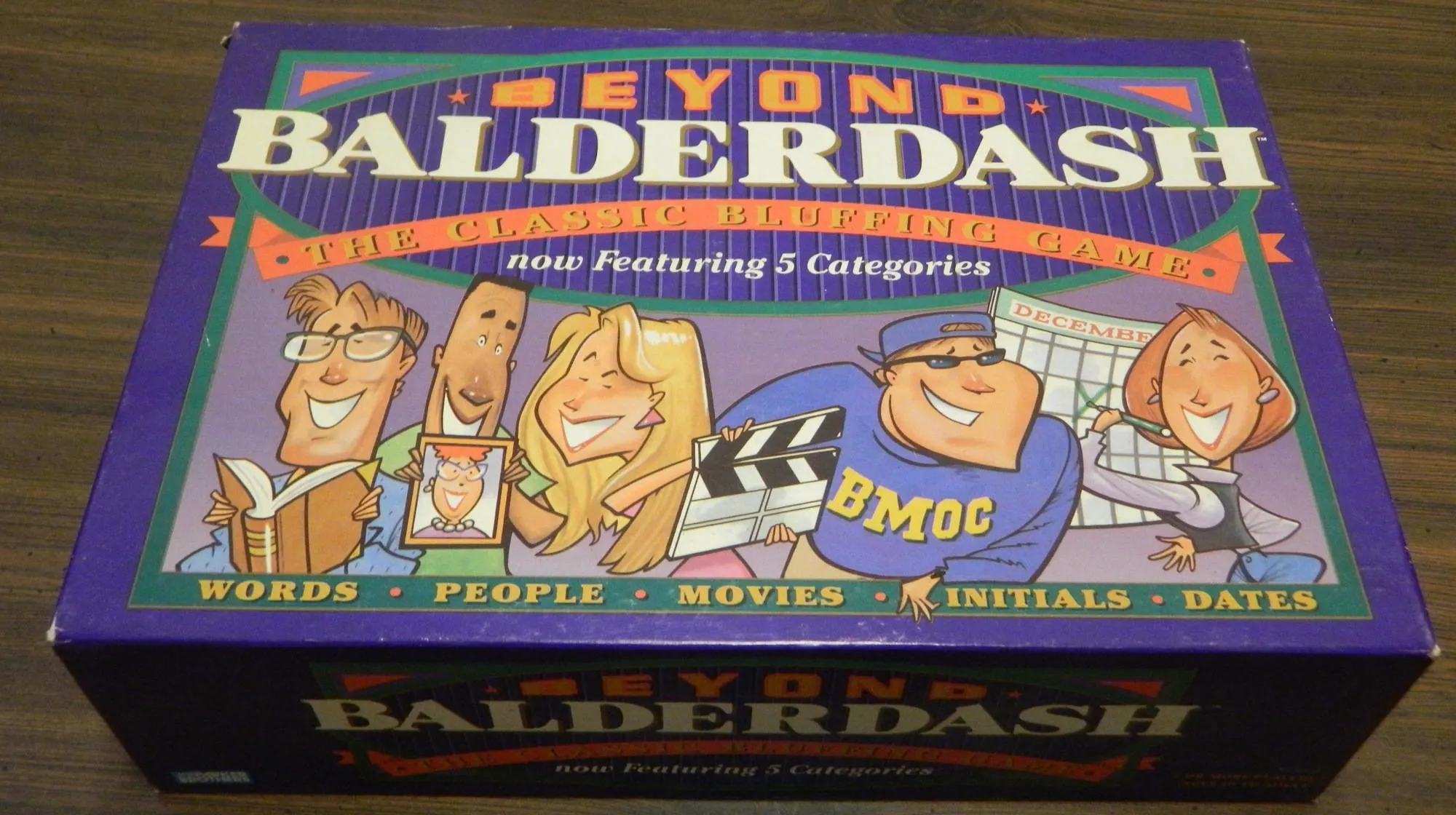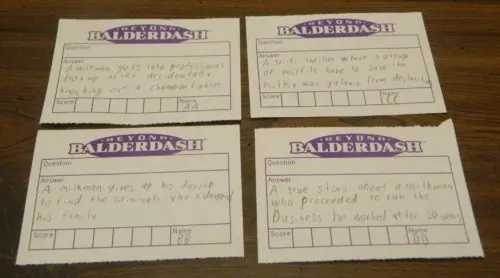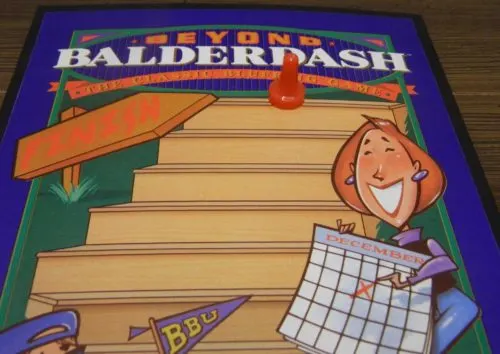The original Balderdash was created back in 1984 and is generally considered a classic party game. Based on the public domain game “Dictionary”, the goal of the game is to bluff the other players with their own definitions of obscure words. Nine years after it was first introduced, the designers decided to make a sequel to Balderdash known as Beyond Balderdash/Absolute Balderdash. Instead of just guessing definitions of words; players could guess the importance of a date or person, what a set of initials stand for, or even the plot of a movie. Being a fan of the original game I welcomed these additions as they seemed like they would add more variety to Balderdash. Beyond Balderdash is the perfect example of what a board game sequel should be, it takes everything you like about the original game and adds to it to make an even better game.
How to Play Beyond Balderdash
Setup
- All of the players take a writing utensil and a sheet of response pads.
- Each player chooses a playing piece and places it in on the start space of the game board.
- The players take turns rolling the die. The player who rolls the highest number gets to be the first “dasher”.
Playing the Game
Each round of Beyond Balderdash begins with the current dasher taking a card. The dasher will then choose which category will be used for the round. The player can either choose the category they prefer or they can roll the die and choose the corresponding category. If the player rolls a six, they can choose the category. The different categories in the game are as follows:
- Words: Players need to write down a definition for the word.
- People: Players need to describe what the person is known for.
- Initials: Players need to write down what the initials stand for.
- Movies: The players are given the title to a real movie. The players have to describe what the movie is about.
- Dates: Players need to describe which historical event happened on the date.
After the category is chosen, the dasher tells the other players the category and reads the question. All of the players besides the dasher will then make up an answer for the question. Outside of the slim chance you actually know the correct answer, players will have to make up their answer. Players can make their answer as serious or as silly as they want. They probably want to make their answer reasonable though as they want other players to choose their answer as the correct answer. Each player signs their slip and hands it to the dasher without any of the other players seeing it.
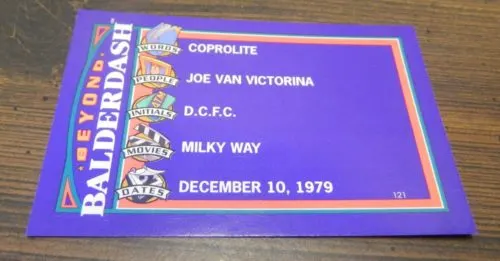
For this round the movies category was chosen. The players will have to write down what they think the plot of Milky Way is.
While the other players are making up their answers, the dasher looks at the back of the card and writes down the correct answer on one of their answer slips. If there are four or less players, the players can choose to let the dasher also submit their own answer in addition to the correct answer. When all of the answers are submitted, the dasher silently reads through all of them to make sure they know what is written on each slip. If the dasher does not understand an answer, they return it to the player who submitted it so they can make changes. If a player submitted an answer that is very close to the correct answer, the player’s answer is removed from the game. This player automatically scores three points but does not get to vote. If two or more players submit answers close to the correct answer, a new card is drawn and the round is replayed. All of the players who submitted a correct answer though will still receive their three points. When all of the answers are acceptable, the dasher mixes up all of the answers and reads them out loud one at a time. If requested the dasher can repeat the answers one or two more times.
The players then proceed to voting. Starting with the player to the left of the dasher, each player guesses which answer they think is correct. After everyone (except for the dasher) has made a guess, the dasher reveal the real answer. Players will score points based on how the players voted.
- A player scores 1 point for each other player that voted for their incorrect answer. A player does not receive a point if they vote for their own answer.
- Each player who guessed the correct answer will score 2 points.
- If none of the players guess the correct answer, the dasher scores 3 points.
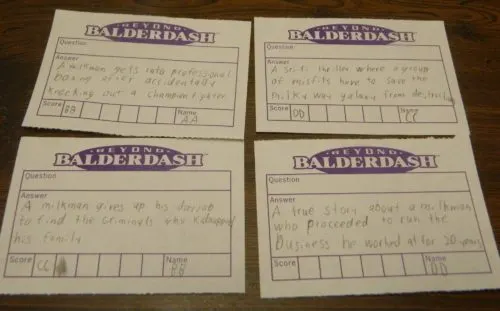
For the above prompt the correct answer is the top left answer. BB guessed the right answer so they will receive two points. BB will also score an additional point because CC guessed the answer they provided. CC will also score a point because DD chose their response.
Starting with the player to the left of the dasher, each player moves their piece forward spaces equal to the number of points they scored. If a player lands on the “double score” space, they will score double points on their next turn.
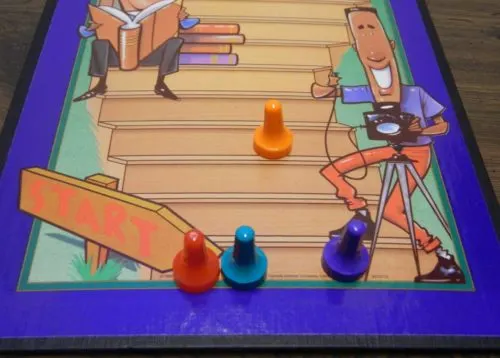
The orange player scored three points in the round. They will move their pawn forward three spaces on the gameboard.
After the scoring is completed and no one has won, another round is started. The player to the left of the previous dasher becomes the next dasher.
End of Game
The game ends when one of the pawns reach the finish space. The first player to reach the finish space wins the game. Players need to make sure pawns are moved in the correct order as the first player to reach the space wins even if another player would have reached the finish space on the same turn.
Two Player Game
If you are only playing with two players, the rules change quite a bit. The dasher will draw three cards from the deck and they will pick a category (can’t pick the initials category). The dasher chooses one of the three cards to be the round’s card. They read out the question on the chosen card and then the answers to the corresponding category from the three cards. The other player then chooses which answer they think is correct. If they are right, they score two points. If they are wrong, the dasher scores one point. The players alternate being the dasher. The first player to reach the finish space wins the game.
My Thoughts on Beyond Balderdash
For the most part sequels generally have a bad reputation. It is usually warranted as sequels rarely live up to the original. While most forms of entertainment like movies and video games get a lot of sequels, board games don’t have as many sequels as you would expect. Most board game sequels only give you additional/alternate cards or take the theme of the original game and try to apply it to different type of game. I would say that most board game sequels feel like more of the same. There are occasional board game sequels that improve on the original game though. Beyond Balderdash is one of those games.
Beyond Balderdash shares a lot in common with the original Balderdash. The gameplay is basically the same as you are still making up definitions while trying to figure out what the correct definition is. The scoring is the same and the gameboard is similar even though I don’t know if they have the same number of spaces. The main difference between the two games is that Beyond Balderdash just adds more to Balderdash. Instead of just making up definitions, you are making up the importance for given dates and people, what initials stand for, and even the plots of movies. The addition of these extra categories adds a lot of variety to Balderdash, which can get a little repetitive coming up with definition after definition. In my opinion Beyond Balderdash is superior to the original game in every way. This opinion is shared by Parker Brothers as it eventually rebranded Beyond Balderdash as the original Balderdash. The only difference is that they exchanged the date category with the “stupid” law category found in the British version of Beyond Balderdash.
For the most part I liked the new categories included in Beyond Balderdash. They all bring something new to the game and they add quite a bit of variety. I would probably say that the people and date categories are the two I liked the least. It was just harder to come up with good fake answers for these two categories as players tended to just pick a historical event and tied them to it. The abbreviations category works pretty well as it is pretty straightforward to come up with an answer. I think my favorite though was the movie category as it was fun coming up with random movie plots based solely off of a title. While I preferred some categories over others, I thought they were all valid additions to the words from the original game.
Like the original Balderdash, I really enjoyed Beyond Balderdash. While I wouldn’t consider it to be my favorite party game, I have never played a game of Balderdash or Beyond Balderdash and not enjoyed it. There is just something about the game that makes it a classic party game. I think the main reason that the game is so successful is that it is so simple and straightforward. As long as you are old enough to read and write, you can play the game. Younger kids may have trouble coming up with believable answers, but they should have no trouble playing the game. The rules take just a couple minutes to explain and whether you play a lot or few board games, you should have no trouble playing the game.
The other reason I think Balderdash is so successful is that it kind of feels like a non-traditional trivia game. Each question in the game actually has a correct answer and thus can be seen as a trivia question. The answers submitted by the other players along with the correct answer become the multiple choice answers. The questions are generally so obscure though that the players will rarely know the answers. The words for example are the type of words that you would only know if you work in the associated field or are a real wordsmith. The same applies to the new categories in Beyond Balderdash. At first you would think this is a bad thing.
The reason that it works so well though is that everyone is put on an equal footing. Outside of the rare occurrences where someone actually knows the correct answer, the game comes down to making up good answers and seeing through the other players’ bluffs. At first your answers might stick out against the correct answer but you quickly adjust and start writing answers that could legitimately be on the card. The game then becomes truly interesting as you try to wade through the answers to figure out what answers were provided by the other players. There is something satisfying about coming up with answers that fool the other players while figuring out the correct answer for yourself.
While you could play Beyond Balderdash seriously, there will usually be at least one silly answer for each question. Sometimes the silliest answer is actually the correct answer. These silly answers generally illicit some laughs. When developing your answer, you don’t want to go so odd that no one will believe your answer. You need to come up with something somewhat random though as rarely are the answers what you would expect. It is hard not to laugh at some of the completely random things that players can come up with.
As far as skill versus luck, I would say that Beyond Balderdash tends to lean a little more towards skill. There is a technique to writing good answers in the game. You need to come up with something pretty random as most of the actual answers come out of left field. You also need to provide enough details as the correct answers are usually not vague. At the same time you don’t want to provide too many details. The correct answers are written in a certain way so if you can emulate the style it will be easier to trick the other players. There is still some luck to the game though. You could come up with the perfect fake answer and even do a good job guessing the correct answer, and still not win the game. To do well in the game you have to rely on other players choosing your answers. Sometimes it doesn’t matter how good your answers are as players for one reason or another won’t pick them. Some players are going to have an advantage in the game, but most players should have a chance of winning at the start of the game.
While I really liked Beyond Balderdash, there are a couple things that I think the game could have improved.
First I don’t like how the game handles voting. In Beyond Balderdash the players take turns making their guesses starting with the player to the left of the dasher. As players reveal their guesses out loud, players will receive additional information before voting. If a player votes for an answer it usually means that they didn’t submit that answer. Players can technically vote for their own answer but for the most point I don’t think it is worth it. Maybe if you are playing with a lot of players it might pay if you can trick three or more players. If you can’t trick a lot of players though, you are better off just trying to guess correctly as if everyone guesses incorrectly the dasher scores three points.
I honestly don’t know why the game doesn’t just have everyone vote at the same time. I think this would solve a lot of the problems with the voting. As all of the players would be voting at the same time, there is no need to vote for your own answer. Instead you could vote for what you think is the actual right answer. Having all of the players vote at the same time also prevents any of the players getting more information than the other players. I really don’t know why the game didn’t implement this rule as it would be easy to have all of the players give their answers at the same time. I know I would never want to play Beyond Balderdash again without having all of the players vote at the same time.
The second problem that I had with Beyond Balderdash is that I don’t like the game board. Just like the original Balderdash, I see no real point for the game board. The game board feels like an unnecessary component and mostly just adds more luck to the game. The double point space in particular is stupid as you shouldn’t get extra spaces just because you were lucky enough to land on a specific space. I also don’t like that a player can ultimately win the game because they were able to move their playing piece first.
Beyond Balderdash should have just used a score pad instead of the game board. The game would be played the same except that each player’s score in each round would be recorded. The players would play a chosen number of rounds and the player who scored the most points would win the game. This would eliminate luck from the game board as each player would be the dasher the same number of times. The winner would solely come down to who scored the most points.
The final issue with Beyond Balderdash is that the game can go a little long at times. Unless one player dominates, I would guess most games will take at least 45 minutes and a lot of games would take longer than an hour to complete. I personally think that is a little long for the type of game that it is. The game would be better at 30-45 minutes. While I don’t like to rush players, I think you should implement some sort of time limit to submit answers as otherwise the game can kind of drag. This is worst for the dasher as they mostly have to just sit around waiting for the other players to finish writing their answers. Unless you have a lot of players I would recommend letting the dasher submit their own answer so they have a better chance at scoring points, and they won’t have to sit around so long for the other players.
Finally I want to quickly talk about the game’s components. The component quality for the most part is quite average. The game’s artwork is fine for the most part. The gameboard and playing pieces are pointless as I think you would be better off just ditching them entirely. While you could easily just use pieces of paper, you will run out of the answer sheets pretty quickly. For the most important component though, the cards, I was impressed with Beyond Balderdash. The game has around 500 cards which is quite a few as there are five categories on each card. You could theoretically play 2,500 round before ever repeating a round. I don’t think you would ever have to worry about running out of cards in Beyond Balderdash.
Should You Buy Beyond Balderdash?
Just like its’ predecessor, Beyond Balderdash is a great party game. It actually succeeds at improving upon the original Balderdash. Beyond Balderdash takes everything good about the original game and makes it better by adding more variety. Instead of just coming up with definitions, you also get to make up things about people, dates, abbreviations and movies. The reason Beyond Balderdash works is that it is a simple game that everyone can pick up and enjoy. The game is something that everyone can enjoy, and yet there is some skill in making up your answers and deducing the correct answer. The game can even be pretty funny from time to time. Beyond Balderdash does have a couple issues though mostly coming from the voting, game board, and the length. Beyond Balderdash may not be for everyone but I think it is a very good party game.
If you never really cared for the original Balderdash or party games in general, Beyond Balderdash is probably not going to be for you. If you already own a version of Balderdash (released after 2006), there is no reason to purchase Beyond Balderdash unless you want more cards. If you really enjoy the original Balderdash or like these type of party games though, I would highly recommend picking up Beyond Balderdash.
If you would like to purchase Beyond Balderdash, you can find it online: Amazon, eBay

